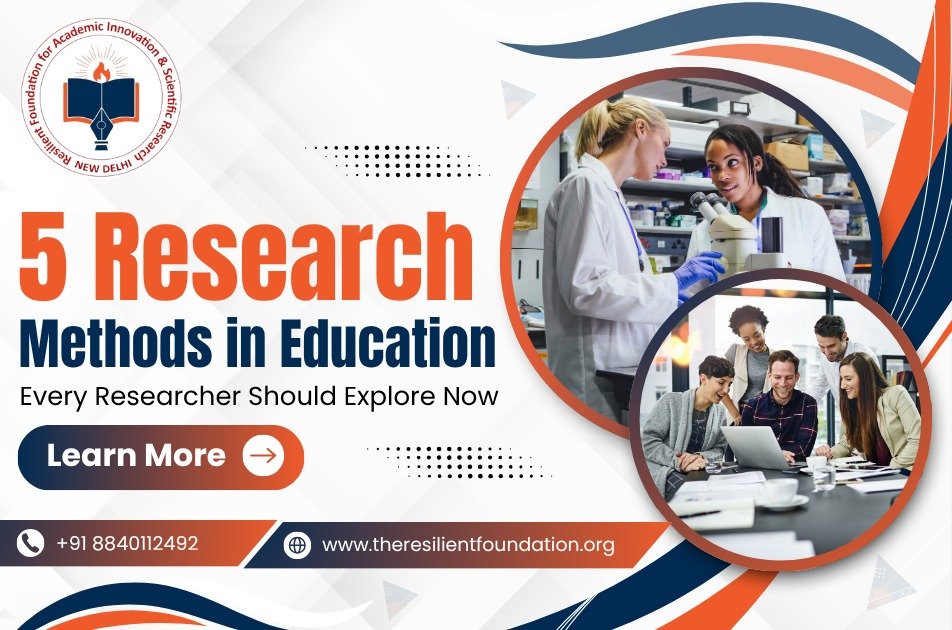Research in education helps us understand how people learn, how teachers teach, and how to improve schools. It guides decisions that can make teaching and learning better. If you are interested in research about education, knowing the different research methods in education can help you find useful answers. Here, we will discuss five research methods every researcher should explore. These methods will help you get valuable results and improve education for both students and teachers.
Qualitative Research: Explore Human Thoughts & Behaviour

Qualitative research is all about understanding how people think, feel, and behave. In education, this method helps us understand how students and teachers feel and act in the classroom. It is used to get a deeper understanding of why people behave the way they do in educational settings.
- This method focuses on understanding the feelings, thoughts, and experiences of people.
- Data is collected through interviews, observations, and group discussions.
- It helps us understand the reasons behind certain behaviours or actions in education.
- Researchers can explore the emotional and social aspects of learning.
- It gives us a detailed picture of how students and teachers experience education.
So, if you like listening to people and learning from their stories, this method will help you a lot.
Quantitative Research: Use Data for Clear Results
Quantitative research uses numbers, data, and facts. It helps you study things in a very clear and simple way. These research methods in education give results you can show in graphs or charts.
- You can give surveys, ask questions, or collect test scores to get data.
- This helps you in your research about education when you want to study how many students pass or how often they study.
- You can also use this to study whether new technology in education helps students get better marks.
- This method gives strong results and helps with innovation in education because it shows clear facts.
- You can also use it to compare schools in different places. That helps you understand the comparative education meaning.
So, if you like numbers and simple answers, this method is a good choice.
Mixed Methods: Combine Numbers with Real Insights

Mixed methods research is when you use both numbers and words. It mixes qualitative and quantitative methods. These research methods in education help you get a fuller and better understanding.
- First, you collect numbers. Then you talk to people to understand the story behind the numbers.
- This is very helpful in your research about education when both facts and opinions matter.
- You can use it to study how new technology in education works by checking results and also asking students how they feel.
- This method helps you bring new ideas and supports innovation in education by showing both sides.
- You can use it to study how students learn in different places. That’s how it helps explain the comparative education meaning.
So, if you want to understand both what is happening and why it is happening, this method is perfect.
Action Research: Solve Problems While Teaching
Action research is used by teachers to solve classroom problems. They try new things in class and see what works. These research methods in education help make learning better while teaching is happening.
- The teacher sees a problem, thinks of a new way, tries it in class, and watches what happens.
- This method is good for research about education because it helps teachers improve their teaching.
- You can test new technology in education in your class and see if students learn better.
- Because it happens inside the classroom, it helps bring innovation in education very quickly.
So, if you are a teacher and want to make your class better right now, this method is very useful.
Experimental Research: Test and Compare Teaching Methods
Experimental research is one of the key research methods in education that focuses on testing and comparing different teaching methods to see which one works best. Researchers use this method to test various teaching strategies and find out what helps students learn the most.
- Researchers create groups of students and teach them using different methods.
- One group might get a new teaching method, and the other group might learn with a traditional method.
- Researchers then compare how well the students perform.
- Experimental research helps find out which teaching methods are the best.
- It is useful for testing new teaching ideas and tools.
Grow Your Research Skills with Expert-Led Guidance
It can be hard to learn all these methods on your own. But with the right help, it becomes easy. You can join online workshops to learn from experts simply.
- These workshops will teach you about all the research methods in education using easy steps.
- You can do real research about education topics and learn by doing.
- You will also use new technology in education during the training, which makes learning fun.
- These workshops help you think in new ways and support innovation in education.
- You will also do tasks that help you understand the comparative education meaning by comparing schools and learning styles.
So, join Resilient Foundation’s online workshops and grow your research skills. It’s a great way to learn and bring change in education.

